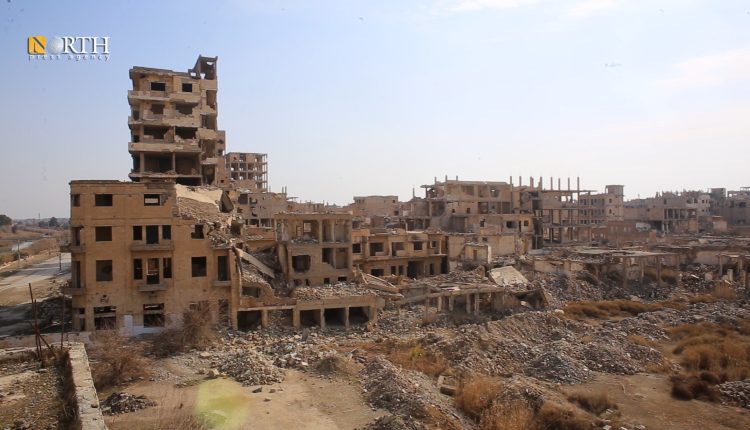DEIR EZ-ZOR, Syria (North Press) – Amid deteriorating economic conditions and soaring rental prices, many residents of Deir ez-Zor city, eastern Syria, are facing daily challenges in securing adequate housing, particularly in neighborhoods devastated by bombing and destruction.
After years of conflict and ruin, life has gradually begun to return to areas in the west of Euphrates River as residents return to their homes following the fall of the Assad regime and the departure of Iranian-backed militias.
However, their joy has been overshadowed by immense challenges in rebuilding their lives amid the devastation left by the war. Rubble still surrounds them, filling destroyed homes and streets.
High rental prices
Mahmoud Sheikh Hamoud, a resident of the al-Omal neighborhood in Deir ez-Zor, tells North Press, “Due to the high cost of rent, I was forced to renovate my deteriorating home.” He explains that he had been displaced in the city of Raqqa, and upon returning to his city, he found himself unable to afford an apartment.
“The situation is extremely difficult. People cannot find a decent place to live, and rental prices are far beyond our means,” he adds. “Renovation was my only option.”
Hamoud noted that his daily income barely covers basic necessities. “As a taxi driver, I earn 50,000 Syrian pounds a day, which is barely enough to buy food.”
Meanwhile, rental prices range between one million and 1.5 million Syrian pounds, he says. “I simply cannot afford such costs, so I have covered my windows and doors with blankets and tarpaulins.”
The housing crisis in Deir ez-Zor continues to worsen, leaving many unable to secure shelter against the harsh winter cold or the scorching summer heat.
Many returnees are struggling not only to remove rubble but also to find alternative housing amid skyrocketing rental prices and stagnant wages.
After years of war, Syrians have become the world’s largest refugee population, now spread across more than 127 countries, according to Human Rights Watch.
“My pension is not enough”
Jassem al-Abdullah, a retired employee from Deir ez-Zor, tells North Press, “My house was severely damaged by shelling, and I cannot afford to pay rent. I have a family of 12, and my pension is not even enough to buy bread.”
He, too, resorted to covering windows and doors with blankets, living with his family in dire conditions, with no alternative source of income. “Prices are extremely high, and my pension barely covers the basics,” he says.
“At home, we often do not have enough food, and I constantly have to make do with what little we have. Covering the windows with blankets does not protect us from the cold. It is just something we have had to get used to. The real problem is that everyone here is suffering the same fate.”
Ahmad Jalad, another resident of al-Omal, shared a similar ordeal. “My house is completely destroyed, and my neighborhood has suffered massive devastation—only four homes are still habitable.”
“I am renting a single room for 200,000 Syrian pounds a month, while my salary is just 250,000. Prices keep rising, and people in my neighborhood cannot afford rent or even a loaf of bread,” he says.
Describing the struggle of daily life, Jalad adds, “I survive on bread, oil, and thyme. If I pay 200,000 for rent, I am left with only 50,000, which is not enough to buy meat or chicken. So we rely on bread and oil—it has become a daily battle for survival.”
Returning residents are calling on local and international organizations to step in, highlighting Deir ez-Zor as one of the most devastated areas in Syria.
In late January, U.N. High Commissioner for Refugees Filippo Grandi urged the international community to support Syria’s reconstruction efforts to facilitate the return of millions of displaced Syrians to their homes.

